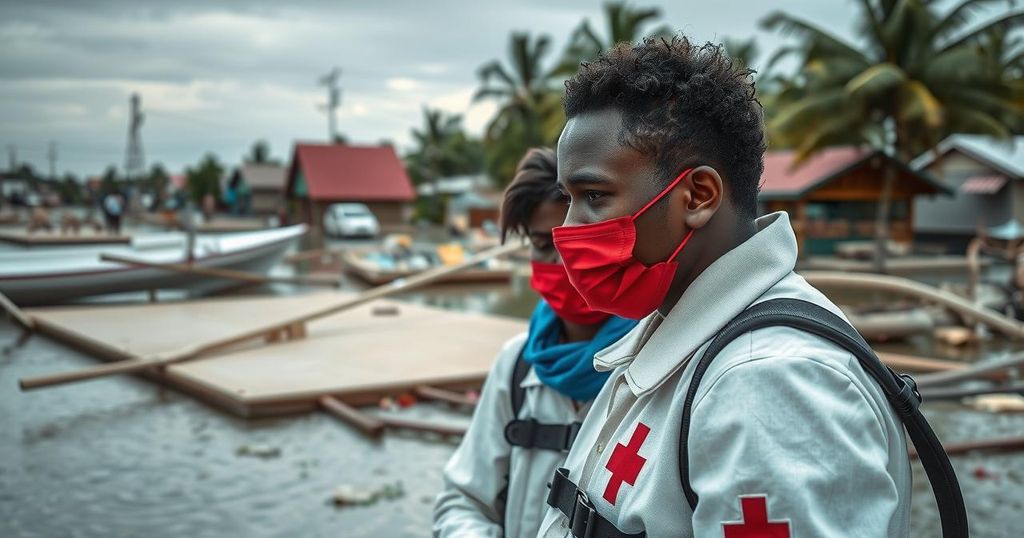World news
AFRICA, AM, CROSS, EMERGENCY RESPONSE, EMMANUEL MACRON, EUROPE, FRANCE, FRENCH RED CROSS, HURRICANE BERYL, IFRC, INTERNATIONAL FEDERATION OF RED CROSS AND RED CRESCENT SOCIETIES, MA, MAMOUDZOU, MAYOTTE, MOZAMBIQUE, NATURAL DISASTER, NATURAL DISASTERS, RED CROSS, SOUMAILA
Li Chen
0 Comments
Cyclone Chido: Rising Death Toll and Missing Red Cross Volunteers in Mayotte and Mozambique
Tropical Cyclone Chido has led to a rising death toll in Mayotte and Mozambique, with reports of over 200 missing humanitarian volunteers from the Red Cross. Local authorities fear fatalities could reach into the thousands as they face significant challenges in providing emergency assistance. French President Macron plans to visit to address the crisis amidst escalating political tensions over immigration and regional governance. The cyclone’s impact underscores urgent humanitarian needs and the vulnerabilities faced by impoverished populations.
In the aftermath of Tropical Cyclone Chido, the death toll has tragically risen across Mozambique and the French archipelago territory of Mayotte. Local authorities anticipate that fatalities may escalate into the thousands. The French Red Cross has reported that more than 200 of its volunteers are currently unaccounted for. As of now, the official count in Mayotte stands at 22 dead, with over 1,400 individuals injured, according to Mamoudzou Mayor, Ambdilwahedou Soumaila. Emergency responders are focused on preventing further loss of life through the distribution of food and water, as many areas remain inaccessible due to massive destruction.
As winds from the cyclone reached speeds of up to 220 kph, the storm wreaked havoc in Mayotte, creating barriers to emergency response efforts. Mayor Soumaila acknowledged that discovering the extent of the destruction could take several days, with the potential for bodies to decompose and cause health issues if not located and recovered promptly. Over 75 percent of Mayotte’s population lives in poverty, heightening concerns regarding access to essential resources. In response to the dire situation, 20 tonnes of provisions are scheduled to arrive imminently. Additionally, the French government hopes to restore half of the water supply within two days.
President Emmanuel Macron is slated to visit Mayotte to address the situation amidst rising political tensions regarding immigration and governmental treatment of overseas territories. Following the cyclone’s landfall in Mozambique, the country has reported at least 34 fatalities and increased humanitarian needs, with the UN noting that 174,158 individuals have been affected by this catastrophe.
Political leaders are now contesting the adequacy and responsiveness of governmental measures in light of climate change and the persistent issue of illegal immigration in Mayotte. The rising death toll and destruction underscore the urgent need for improved disaster preparedness and response strategies.
In summary, Cyclone Chido has delivered a devastating blow to both Mayotte and Mozambique, claiming lives, causing injuries, and missing humanitarian workers. The unfolding humanitarian crisis highlights the pressing need for swift aid and recovery efforts, as well as a reevaluation of immigration policies affecting marginalized populations. The long-term impacts of this cyclone will require extensive recovery efforts for both nations, with particular attention to the socio-economic vulnerabilities exacerbated by such disasters.
Tropical Cyclone Chido represents one of the most powerful storms to strike Mayotte in nearly a century, leading to significant devastation and an alarming death toll. This cyclone not only impacted a territory grappling with substantial poverty but also heightened the political dynamics of immigration and governmental responsiveness to crises. In Mozambique, the cyclone caused additional casualties and widespread destruction, further complicating ongoing humanitarian challenges faced by the region. The combined effects of such disasters expose the vulnerabilities of populations living under precarious conditions, underscoring the necessity for robust emergency management strategies and humanitarian support.
Cyclone Chido’s aftermath has revealed the severe toll on life and infrastructure in both Mayotte and Mozambique. Efforts to provide immediate aid are underway, but the situation remains precarious with the potential for further loss of life. The implications of this disaster extend beyond immediate physical damage, raising critical questions about disaster preparedness, immigration policies, and socio-economic disparities faced by the affected populations. Ultimately, a comprehensive strategy is required to enhance resilience against future disasters and ensure the well-being of vulnerable communities.
Original Source: www.abc.net.au




Post Comment